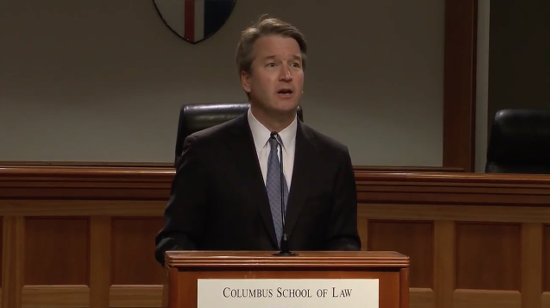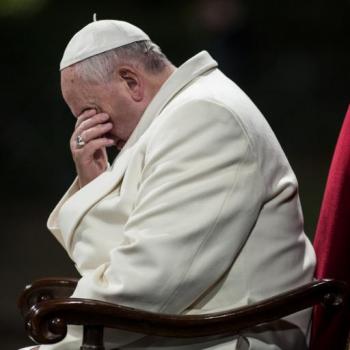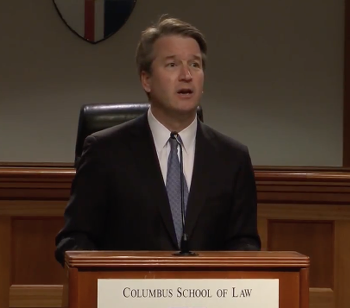Donald Trump has nominated Judge Brett Kavanaugh to the Supreme Court, according to NBC News. You’re going to hear a lot over the next few days and weeks about his extremely conservative judicial history — and how he will undoubtedly oppose abortion rights. All of that is important.
But there’s one specific case that will likely get overlooked by the media but which gives us insight into how he views atheists and church/state separation in general — and it’s not a good sign.

Because Kavanaugh was on the Appeals Court in the D.C. Circuit, he mostly avoided cases involving controversial social issues, but there was one big case in which he directly tangled with an open atheist over an issue involving prayer and the government.
In 2008, atheist Michael Newdow filed a lawsuit over the use of prayer during Barack Obama‘s inauguration ceremony.
Specifically, Newdow and the other plaintiffs — a Who’s Who of atheism in 2008 — tried to stop Chief Justice John Roberts from giving the oath of office with the words “so help me God.” They also opposed the use of clergy (like Pastor Rick Warren) during the ceremony. Both issues, they said, violated the First Amendment.
A judge initially put a stop to the lawsuit — and the inauguration went ahead as planned — only to dismiss the case months later, saying Newdow and the other plaintiffs lacked standing. They hadn’t really suffered from the inauguration, said the judge, so they had no business suing over it. Furthermore, even if they were harmed, it’s not like the courts could be expected to do much about it.
U.S. District Judge Reggie B. Walton wrote:
… the Court finds that none of the plaintiffs in this case have standing to challenge the defendants’ actions as pled in the complaint because they have identified no concrete and particularized injury. And, even if the plaintiffs could establish such an injury, they have failed to demonstrate how the harm they allege is redressable by the relief they seek, or that the Court has any legal authority to award the relief requested. Therefore, the Court finds that the plaintiffs lack standing to bring this action and that it must dismiss this case.
Newdow then appealed the decision to the D.C. Circuit Court, and a three judge panel — including Brett Kavanaugh — affirmed the earlier decision that Newdow’s group lacked standing. (They also noted that, as Newdow wanted to prevent prayers from the 2013 and 2017 inaugurations, it would be better handled through legislation, not the courts.)
But here’s where it gets interesting.
Kavanaugh issued a concurrence (which he didn’t have to do) that said he thought the atheists had standing — and he would’ve preferred to rule against the atheists on the merits.
Watch how he butters up the atheists before pivoting to the typical conservative Christian talking point:
… In our constitutional tradition, all citizens are equally American, no matter what God they worship or if they worship no god at all. Plaintiffs are atheists. As atheists, they have no lesser rights or status as Americans or under the United States Constitution than Protestants, Jews, Mormons, Muslims, Hindus, Buddhists, Catholics, or members of any religious group.
…
… we cannot resolve this case by discounting the sense of anguish and outrage plaintiffs and some other Americans feel at listening to a government-sponsored religious prayer. Any effort to tell plaintiffs that “it’s not a big deal” or “it’s de minimis” would be entirely out of bounds, in my judgment. Plaintiffs’ beliefs and sincere objections warrant our respect.
…
… we likewise cannot dismiss the desire of others in America to publicly ask for God’s blessing on certain government activities and to publicly seek God’s guidance for certain government officials. Plaintiffs suggest that no one should be upset if government ceremonies were entirely cleansed of religious expression; they argue that such a regime would reflect true government “neutrality” toward religion. Others respond, however, that stripping government ceremonies of any references to God or religious expression would reflect unwarranted hostility to religion and would, in effect, “establish” atheism.
Kavanaugh, of course, agrees with the latter group. He thinks asking for government neutrality when it comes to religion is the equivalent of pushing atheism on everybody. Even though nobody is telling people to stop believing in God.
That’s the same warped logic Ken Ham uses when arguing that the prohibition of teaching Intelligent Design and Creationism in science classes is somehow anti-Christian and a government imposition of Secular Humanism. It’s completely misguided.
What happens if Kavanaugh has to decide if Christian-only invocations at city council meetings are legal? By his logic, a moment of silence would effectively “establish atheism” because it wouldn’t allow government officials to preach at meetings.
As church/state advocates have argued for years, religious neutrality is not the same as promoting atheism. Even atheist lawyers would argue against promoting atheism in a government setting.
If Kavanaugh doesn’t understand that, I have no doubt he’ll tear down the wall of separation between church and state at every opportunity.
One other troubling thing: Kavanaugh also argued in his concurrence that the phrase “so held me God” didn’t promote God at all:
… Like the legislative prayer in Marsh, the words “so help me God” in the Presidential oath are not proselytizing or otherwise exploitative. Moreover, like the practice of legislative prayer, use of “so help me God” in oaths for government officials is deeply rooted in the Nation’s history and tradition.
Tradition. It’s always tradition with these people. Unless the tradition is something they don’t like, in which case it needs to be overturned.
There are a lot of reasons liberals won’t want Kavanaugh on the Supreme Court. But one of the main reasons ought to be his view that it’s okay to promote religion through the government because prohibiting it would somehow, weirdly, be a commercial for atheism.
This is a man who will have the power to merge religion and government. And he’s on the verge of a lifetime appointment to the Supreme Court.
(Screenshot via YouTube)




It’s Moving Day for the Friendly ..."
It’s Moving Day for the Friendly ..."
It’s Moving Day for the Friendly ..."
It’s Moving Day for the Friendly ..."